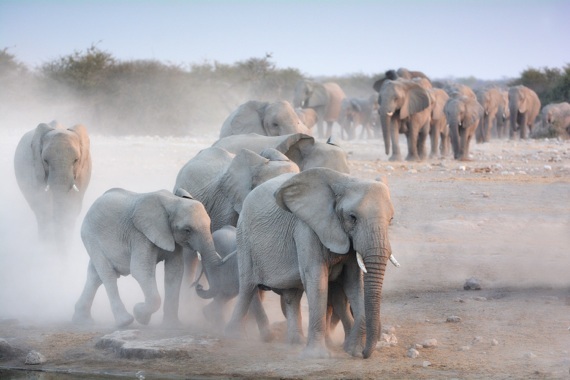On October 3, conservationists from Nairobi to New York marched in support of the world's elephants and rhinos, protesting their wanton slaughter and pressing for governments to do more to ensure their survival. The following day, California joined the global march when Governor Brown signed Assembly Bill 96, or AB96, into law, effectively banning trade in ivory and rhino horn in the Golden State.
Introduced at the beginning of this year by Assembly Speaker Toni Atkins, AB96 intended to close the loopholes long exploited by wildlife traffickers to peddle their illicit products in California. Governor Brown's signature on October 4 sent a clear message that the most populous state in the nation -- and a state that is home to the second largest ivory market in the United States -- has chosen elephants over ivory trinkets, life over needless death, action over inaction.
The passage of this bill into law would not have been possible without the tireless advocacy of passionate Californians, NGOs and lawmakers who felt a moral responsibility to protect species facing extinction. Because elephants, rhinos and other species are dying at the hand of man at unsustainable rates, it is the hand of man that must reach out to save them.
Tens of thousands of elephants are killed annually by poachers. Tanzania alone lost 60 percent of its elephant population in just five years -- 85,000 elephants. They are being killed for their ivory tusks due to high demand for ivory products in markets abroad.
California -- my home state -- is one such market, alongside China, Hong Kong, Thailand and the Philippines. In cities such as Los Angeles and San Francisco, the amount of illegal ivory for sale has doubled in the last eight years, according to a Natural Resources Defense Council report.
Thus, if the demand for ivory products is strong, then the demand to ban ivory trade and protect elephants must be stronger. For every consumer out there who feels compelled to buy rhino horn, there should be twice as many rhino advocates out there dispelling the dangerous myths and raising awareness.
Keeping elephants and rhinos out of the crosshairs of a poacher's gun or safe from the trajectory of a poacher's spear means crushing the demand for elephants' ivory and rhinos' horn. Crushing demand around the world takes time, though, and time is a luxury elephants and rhinos -- and many other species such as lions -- no longer have. So we as conservationists, lawmakers and concerned citizens must step in with our own demands.
We must demand that, wherever trade in ivory, rhino horn and other wildlife derivatives is allowed, it be banned immediately. We must demand that, wherever the wildlife trade laws have loopholes and weaknesses that are continually exploited by wildlife traffickers, the loopholes be closed and the weaknesses in the law identified and rectified. We must demand that, wherever stockpiles of ivory and rhino horn exist, these articles of death and destruction be destroyed without fail. Our demands for action to protect elephants and rhinos must outweigh, outnumber and outcompete any consumer demand for their parts.
With the passage of AB96, California's citizens and their leadership made clear their demands. We are united with New York and New Jersey -- both of which have passed similar laws -- and together our three states have set an example not only for the nation but for the world. Now we ask Washingtonians, Vermonters and the residents and lawmakers of other U.S. states to join us in crushing the illegal wildlife trade. The march doesn't end until the survival of our elephants and rhinos is guaranteed.
David Thomson is Chairman of African Wildlife Foundation's Board of Trustees and a California resident.

